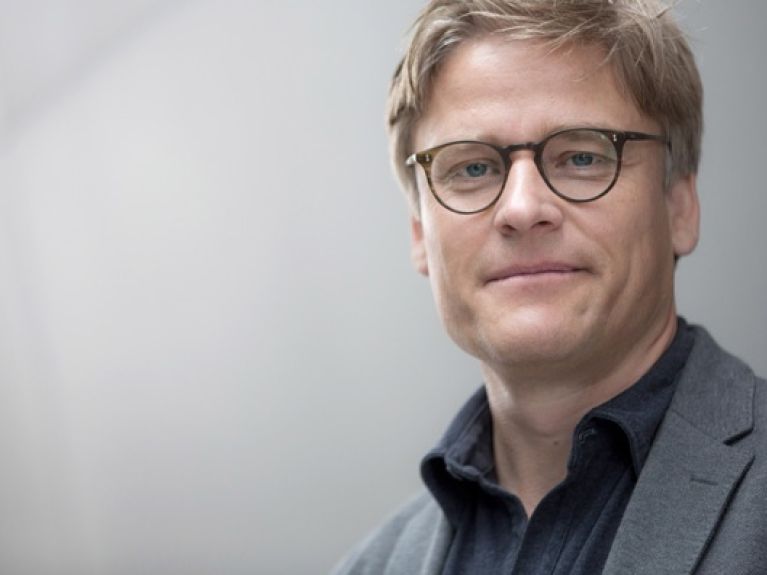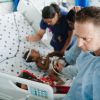“An infection is not a death sentence”
Tankred Stöbe, President of MSF Germany, talks about the aid organisation’s fight against Ebola.

Mr Stöbe, Sierra Leone, Liberia and Guinea are being increasingly severely affected by Ebola. In Nigeria, on the other hand, the threat has been contained. How was that achieved?
In the case of an epidemic like this one, it is important that safety measures swiftly take effect. That means that patients have to be diagnosed quickly, and if an Ebola infection is confirmed, it has to be immediately isolated and treated. Additionally, all the people who have come into contact with that person must be found and informed. If they also develop symptoms within 21 days, they have to make their way to a treatment centre. As long as people do not have any symptoms they cannot pass on the infection. That makes dealing with the disease easier. In Nigeria, after some initial mistakes, people observed these epidemiological criteria. But there was also an element of luck involved.
Why hasn’t it also been possible to implement procedures like that in the West African countries?
The healthcare systems in Sierra Leone, Liberia and Guinea were already rather fragile before the outbreak of the epidemic, and the situation is being aggravated even further every day by Ebola. In the meantime, medical care has collapsed. Many people are now also dying of treatable diseases like malaria. These countries are no longer able to solve their problems alone.
How long could it take to get the epidemic under control?
Roughly 15,000 people have already been infected. The risks increase as each day passes. In Sierra Leone, Ebola is already present in all regions of the country. At the moment it is difficult to make prognoses about the development of the epidemic. We assume we will be fighting Ebola in Sierra Leone, Liberia and Guinea until well into 2015.
What contribution is MSF making to the fight against the disease?
We are running six treatment centres with a total of 600 beds in the three most severely affected West African countries. They have admitted over 6,000 patients, among whom Ebola has been confirmed in roughly 3,800 cases. It has been possible to discharge almost 1,600 of these people as cured. We currently have over 3,400 members of staff on the spot. Since March 2014, some 700 international volunteers have been sent, including 35 from Germany. These specialists are only meant to work four weeks at a time in the crisis region, but many want to go back there soon. Incidentally, we have already flown in more than 1,200 tonnes of aid material.
And how high are the costs of this long-term deployment?
According to the current state of planning, in 2014 we will be spending 52 million euros on the fight against Ebola. In 2015 it will probably be a similar sum. So far the German section of MSF has contributed over 4.6 million euros to financing this effort.
The governments of the United States and European countries are also sending help, but it is obviously not yet enough. Why not?
Experts assume that over 4,000 Ebola treatment beds are required. Only a quarter of those are now available on the spot. However, adequate treatment capacities are the key to successfully combating the epidemic. The Federal Government has been promising swift, concrete assistance since mid-September 2014, but nothing has arrived yet. We don’t understand it.
How could Germany optimise its support?
We need qualified staff on the spot and medical stations. Both need to come together. Additional transport capacities are also required. Possibly infected staff should be flown out to their home countries within 24 hours. We ought to be able to give them that assurance. In addition, a vaccine and affordable medicines to treat the illness need to be developed. As a research country, Germany should help in that respect. ▪
Interview: Kurt de Swaaf
Doctors Without Borders
Médecins Sans Frontières (MSF) – also known as Doctors Without Borders in English – was founded in France in 1971. This independent and impartial international aid organisation concentrates mainly on providing medical care to people in need in crisis regions all over the world. Roughly 90% of the organisation’s funding comes from private donations. It currently has 24 different member associations, including MSF Germany.
Federal Government support for the fight against Ebola
The Federal Government is making available 108.7 million euros to combat the Ebola epidemic. It is supporting the World Health Organisation (WHO), humanitarian non-governmental organisations and research institutes that are providing assistance in the affected countries. At the suggestion of Federal Foreign Minister Frank-Walter Steinmeier, Ambassador Walter Lindner was appointed Special Representative of the Federal Government for the Fight against the Ebola Epidemic. He will coordinate the efforts of the Federal Foreign Office and the Federal Government to combat the disease. Lindner will be supported by the new Ebola task force. Deutsche Welle has brought together a large number of articles about the subject on a special Ebola portal that provides background information and reports on the latest developments.

